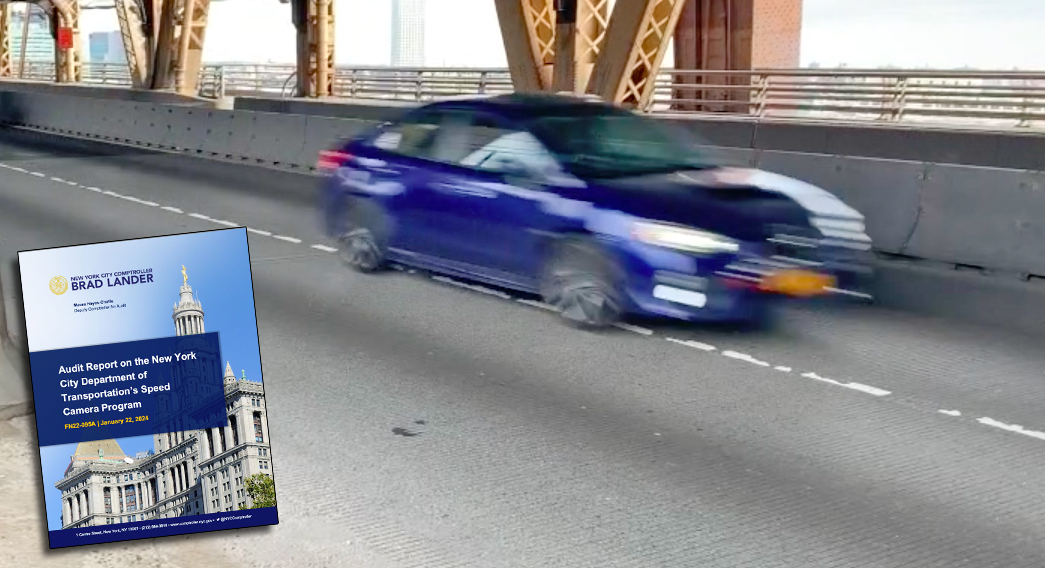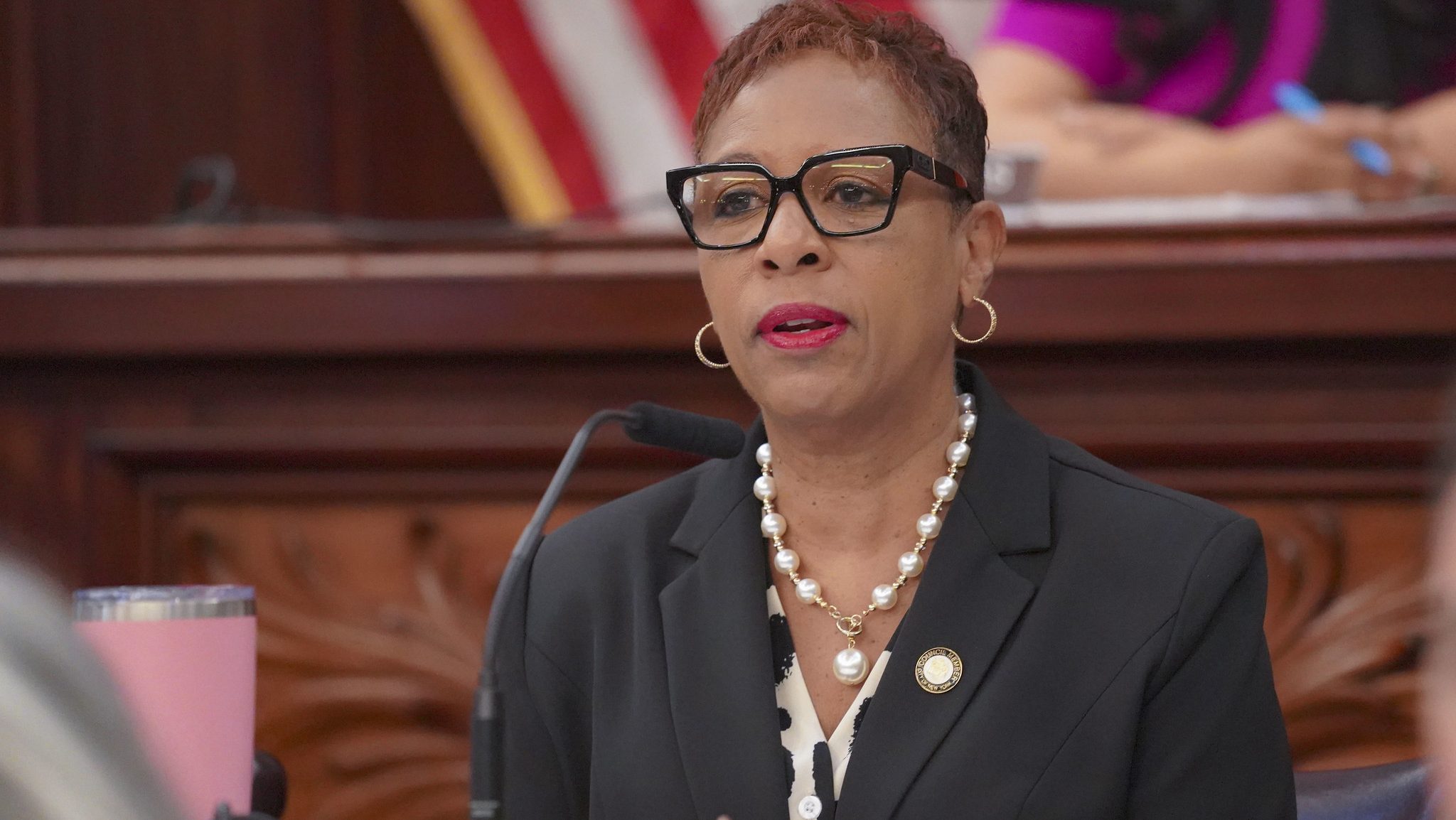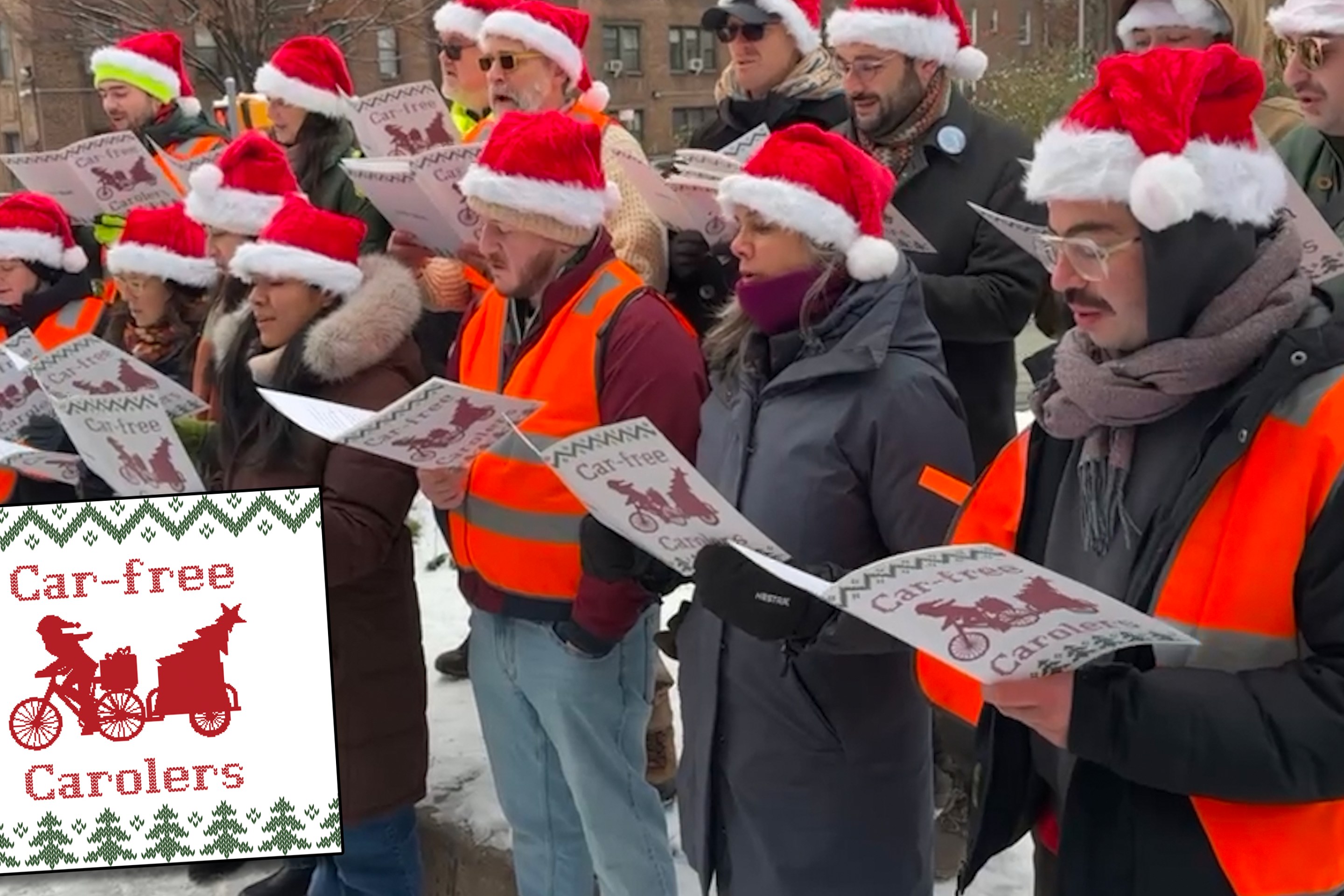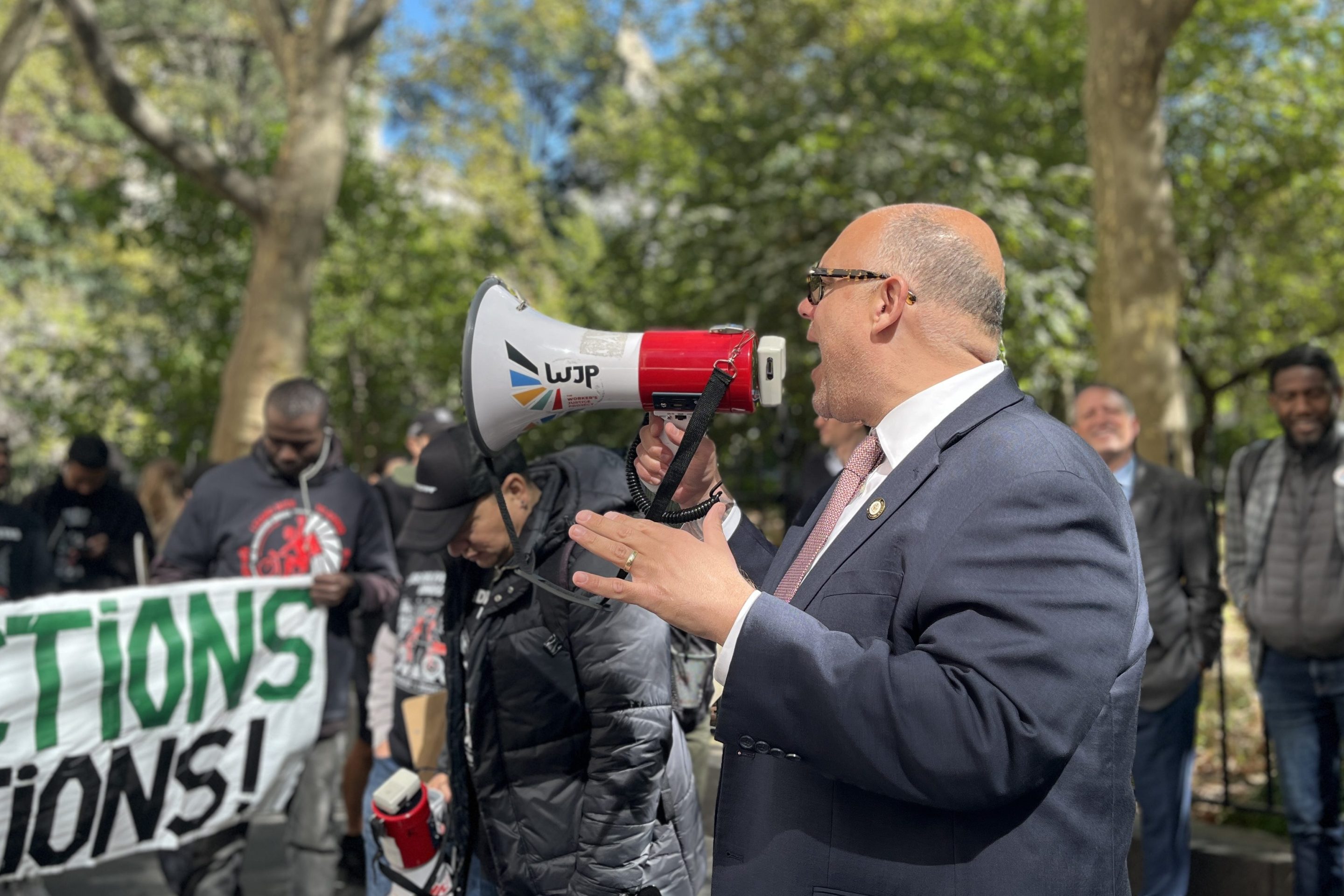The city has failed to deal with the "worsening problem" of vehicles with obscured or covered license plates, resulting in more than $100 million in lost revenue last year alone and, more important, hindering the effort to curtail reckless driving, according to an audit to be released today.
According to City Comptroller Brad Lander, hundreds of thousands of incidents of speeding captured on camera were rejected by the camera program's outside contractor before the ticket was even reviewed by a Department of Transportation analyst. Last year, more than 40 percent of those pictures were rejected.
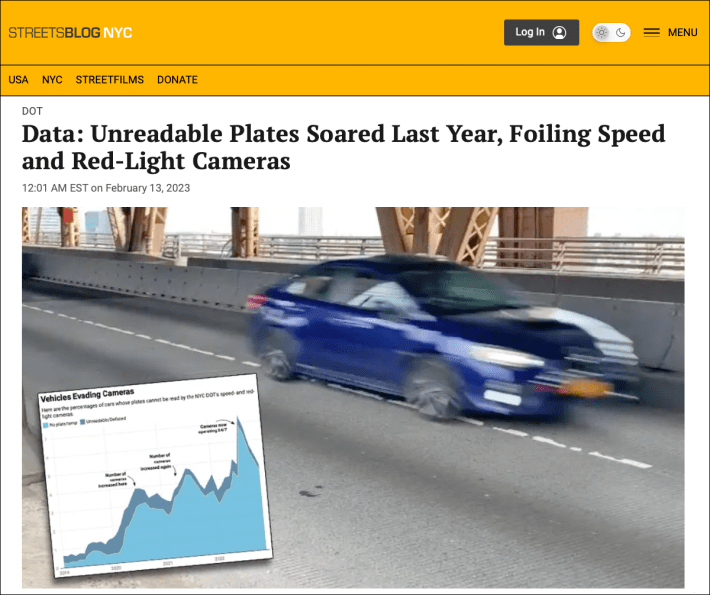
The issuance of tickets is a two-step process: Photos taken by a camera tripped by a driver going 11 or more miles per hour over the speed limit are first reviewed by Verra, the city contractor.
During 2022, Verra rejected 36.6 percent of all photos — and that number rose to 41.5 percent in the first half of 2023, Lander said. Worse, "DOT is unable ... to determine whether rejected speeding events were properly executed by Verra."
There are 80 categories for rejection set up by DOT, including speeding by emergency vehicles.
And DOT's inability to review Verra's rejections means that the agency also doesn't know why some locations have much higher rejection, which undermines the "overall effectiveness of the program," according to the audit.
The increase in Verra rejections is particularly troubling because the number of rejections due to a reckless driver having a temp tag (real or fake) or having no license plate at all rose by 5,356 percent between 2019 and mid-2023 (see chart below), as Streetsblog has long documented. DOT has previously admitted that its cameras cannot read temp tags, real or fake.
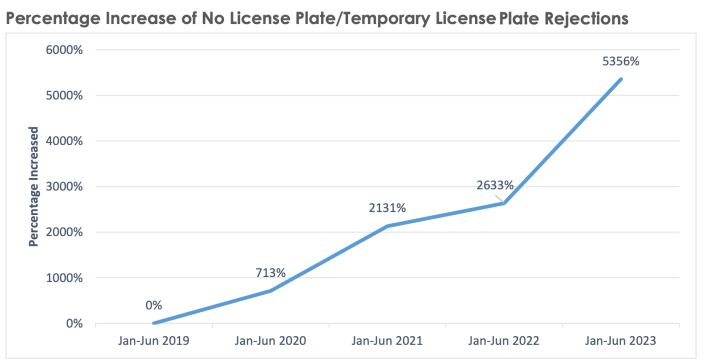
In the first half of 2023, almost 750,000 speeding incidents were rejected because of temp tags or no tags at all — a potential loss of $37 million in just those six months alone.
When Lander included in rejections because of obstructed plates, that number rose to $54 million in just those six months. Obstructed or defaced plates comprise the largest portion of the rejected tickets, a problem that Streetsblog has also been documenting and videotaping.
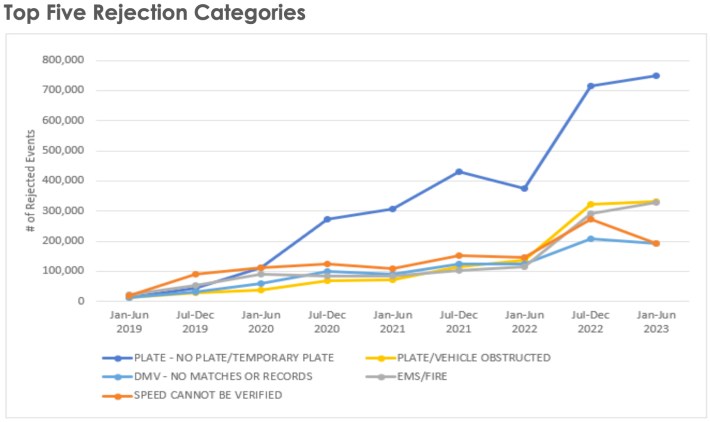
"The data is trending upwards," Lander said, confirming that DOT has not provided data for the last six months of 2023 (Streetsblog has also been seeking those numbers).
This is a crucial flaw because some cameras had a disproportionately high number of rejections, Lander found. One camera in Brooklyn, for example, captured 1,031 speeding events, but 950, or 92 percent, were rejected. One camera in Queens had a 98-percent rejection rate.
And 67 cameras recorded no speeding events at all.
Lander's findings build on what Streetsblog discovered last year when it reviewed DOT's own records for rejected tickets, which rose to an all-time high in August, 2022, shortly after speed cameras became operational 24-7-365. In that month, nearly 7 percent of cars tripping speed cameras had no plate. But those numbers did not include Verra's pre-rejection rejections.
The audit is especially alarming given the upcoming implementation of congestion pricing, which will be overseen by a different outside contractor, TransCore.
As a result of his team's findings, Lander recommended that the DOT:
- Get full access to Verra's rejections.
- Review under-performing cameras for possible re-location.
- Do more to bust drivers with fake or obscured plates.
Lander said the DOT agreed with these and other recommendations, but also reiterated that the purpose of the program is to reduce speeding, not to generate money for the city. Lander's team said it agreed that DOT is not responsible for enforcement against reckless drivers who cover or remove their plates, but reiterated that DOT "has taken no action to address the problem."
In a letter to the comptroller, DOT Deputy Commissioner Josh Benson also reiterated that its hands are somewhat tied.
"A vehicle missing a license plate presents a challenge [because] the authorizing law does not contemplate a secondary investigative process beyond NYC DOT using the photo and video evidence to determine the registered vehicle owner," Benson wrote.
Benson also said that speeding by ambulances and fire department vehicles are rejected by Verra for legitimate reasons, though he did not specify how many of the millions of rejections are due to emergency vehicles. The Lander audit says the number is around 320,000 incidents in the first half of 2023.
The good news is that Lander's audit confirmed that speed camera "work to reduce speeding and crashes." Both the number of tickets issued and the number of crashes drop dramatically at locations with speed cameras, Lander's team found.
After initial publication, the city DOT sent over the following statement.
“DOT’s speed camera program saves lives by changing driving behavior, and by any account has been incredibly successful, with 65 percent of ticketed vehicles receiving only one or two tickets since the start of the program in 2014," spokesperson Anna Correa said. "This means drivers are traveling safer on our streets, which makes our communities and neighborhoods safer as well."
The agency also said that it believes the comptroller's high "rejection" rate will be resolved when the data from upgraded cameras are calculated. Also, the agency said it will soon "advance a future Request For Proposals to operate the program,” but would not provide more details.
